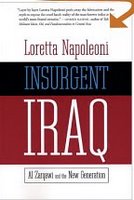Director of Media Relations
Associated Press
Dear Mr. Stokes:
In an article of June 11, 2006, entitled "Violence persists after al-Zarqawi's death," AP author Ryan Lenz wrote, "The Jordanian-born al-Zarqawi was the defining face of Iraq's insurgency." That statement exemplifies the success of the US military propaganda effort, and perpetuates a myth that elevates al-Zarqawi's significance.
The US military wants people to believe al-Zarqawi is the face of the insurgency, because it supports their propaganda needs. What if, instead, the face of the insurgency was someone with legitimate concerns about US intentions in their country? Someone concerned about opening vulnerable economic sectors to foreign transnational corporations, never again to be owned by Iraqis? Somone concerned about the exploitation of labor and Iraq's natural resources? Somone concerned about Coalition Authority laws that allow 100% of the profits made in Iraq to be exported? Someone concerned about the vulnerable banking system from being bought up by foreign corporations? From my reading, a majority of the insurgents are fighting for these interests, not fanatical religious dreams like those of Zarqawi.
It isn't too late to raise my concern with AP editors, who might be able to catch and corrrect statements like the one highlighted above.
Thanks for your consideration.
 NOTE: According to Loretta Napoleoni, author of the book "Insurgent Iraq: Al Zarqawi and the New Generation," the US boosted Al Zarqawi into prominence. In Napoleoni's words, "... let’s not forget that al-Zarqawi was presented to the world as the link between Saddam Hussein and Osama Bin Laden on February 5, 2003, when in reality he wasn't.."
NOTE: According to Loretta Napoleoni, author of the book "Insurgent Iraq: Al Zarqawi and the New Generation," the US boosted Al Zarqawi into prominence. In Napoleoni's words, "... let’s not forget that al-Zarqawi was presented to the world as the link between Saddam Hussein and Osama Bin Laden on February 5, 2003, when in reality he wasn't.." She continues, "Well, for a start, al-Zarqawi met Osama Bin Laden in 2000 in Kandahar, and it was a meeting in which he refused to join Al Qaeda because he could not share Osama Bin Laden's view of far-away enemy, i.e., the United States. He was very much focused on the existing Arab regimes, in particular Jordan. He managed to carve within the Taliban regime a very little niche —- a little camp in Herat, whereby, you know, he started to train future suicide bombers who would be active in Jordan [audio lost]. After the fall of the Taliban regime, he escaped in Iraqi Kurdistan, because he had some contacts there; and it was because of that, because of his presence there, that the Kurdish secret service alerted [audio lost] Al Qaeda man in Iraq had arrived. And, of course you know, that was false information. But the information was embraced by the United States because, in the moment in which they could not find proof of any weapons for mass destruction, the only chance they had to justify intervention in Iraq was to link Saddam Hussein with international terrorism, i.e. Al Qaeda.
So al-Zarqawi became that link, that fictitious link. And that was sufficient to transform a very small leader of an even smaller group of Jihadists into number two member of Al Qaeda in the world. That is really what made al-Zarqawi. From that moment, not only us in the West, but also people in the Muslim world believed that al-Zarqawi was the number two of Al Qaeda. So, people start flocking to join his insurgency. Money starts flowing towards that insurgency. So that was the beginning of the myth. And today we have not at all killed the myth. Unfortunately, because, you know, it's very easy to create these myths. It's very, very difficult to destroy them."
Source: Amy Goodman Interview


